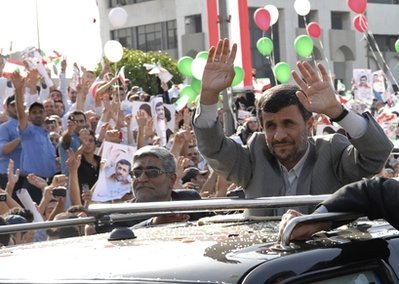Iran Feature: Ahmadinejad's "Problematic Triumph" in Lebanon (Zibakalam)
 Monday, October 25, 2010 at 7:49 |
Monday, October 25, 2010 at 7:49 |  Scott Lucas in
Scott Lucas in  EA Iran,
EA Iran,  EA Middle East and Turkey,
EA Middle East and Turkey,  Middle East and Iran
Middle East and Iran  Professor Sadegh Zibakalam, one of the few academics in Iran who can put forth political criticism --- often carefully framed --- of the Government, writes for Bitter Lemons:
Professor Sadegh Zibakalam, one of the few academics in Iran who can put forth political criticism --- often carefully framed --- of the Government, writes for Bitter Lemons:
Whichever way one approaches Mahmoud Ahmadinejad’s visit to Lebanon, there can be little dispute that it was a personal triumph for the hardline Iranian president. The Iranian media covered the state visit thoroughly and in particular showed the huge crowd that gathered to welcome the Iranian leader. Ahmadinejad’s aides and supporters back in Iran tried to portray the visit as a personal triumph for the president’s “bold, revolutionary and courageous foreign policy.”
Having confronted unabated criticism since the much-disputed presidential election in June 2009, it was only natural for Ahmadinejad to portray his visit to Lebanon as a victory against his opponents in Iran. Whether or not the visit was equally a triumph for Iran itself is a more controversial question. There are many Iranians who ask why our money should be spent on Shiites in Lebanon or for that matter on the Palestinians.
These complaints are no secret; Iranian leaders are painfully aware of them. The classic answer by the Islamic leadership is Islamic solidarity. We support our Shiite and Palestinian brethren in much the same way the Jews in the United States support their brethren in Israel. In the past, this justification more or less convinced many Iranians. However, during the street demonstrations and protests that followed the 2009 elections and particularly at the Quds rally that year, for the first time many Iranians shouted the slogan, "Neither Gaza nor Lebanon, my life for Iran."
The Iranian leadership blamed opposition leaders for that slogan and pressed them to dissociate themselves from and even condemn it. Hence the Ahmadinejad visit to Lebanon was partly in response to increasing criticism by the Iranian people as to why the country's money must be spent on the Palestinians or the Shiites in Lebanon. The Iranian leaders have tried to explain to critics of their pro-Hamas and pro-Hizballah policy that it is a "strategic investment". "If we had not armed Hizballah in Lebanon, we would have had to confront the Israelis at our borders in Iran," stated an Iranian leader in response to those who questioned the wisdom of this investment.
In other words, Iranian policy in arming and investing in Hizballah is a deterrent strategy to safeguard the country from the myth of the Israeli armed forces. So is Iran's support for Hamas in Gaza. What is militarily more beneficial to the Islamic regime, asked the same Iranian leader, "to fight the Israelis near Tel Aviv or Jerusalem, or near Tehran and Isfahan?" So the best strategy for Iran is to arm Hizballah to prevent Israel from attacking it.
There is a flaw in this argument, an Iranian academic responded. It assumes there is an inherent animosity between the two countries and therefore envisages that war and confrontation between the two states are inevitable.
Another issue concerning Ahmadinejad’s visit to Lebanon was raised by Mohammad Reza Khatami, brother of ex-President Khatami and a leading reformist figure. Hizbullah leader Sayyed Hassan Nasrallah praised Ahmadinejad as a hero. He forgot that the Iranian president faces a lot of opposition inside his own country. For Nasrallah, Ahmadinejad is president of the country that during the past three years spent huge sums of money on Lebanon’s Shiites. He therefore was full of praise and admiration for Ahmadinejad. One cannot imagine that the Lebanese Shiite leader was unaware of Ahmadinejad’s lack of popularity among many of his own people, particularly the more educated Iranians. Yet he extolled Ahmadinejad like a hero, to the disappointment and the anger of many Iranians.
Nasrallah was of course walking a tightrope. On the one hand, he could not have risked provoking the anger of his “rich” guest by not admiring and praising him. Yet on the other hand, to do so angered many Iranians. Caught between these two opposing forces, we know which one he opted for. And it was precisely Nasrallah’s indifference toward the Iranian people, or at least his indifference toward Ahmadinejad’s critics, that mohammad Reza Khatami pointed out in an open letter addressed to the Hizbullah leader.
Whatever justification Nasrallah had for praising Ahmadinejad in this manner, his behavior further strained the feelings of many Iranians toward Hizbullah. Perhaps Nasrallah feels that neither he nor his movement needs the support of ordinary Iranians and that the Iranian leadership’s backing is sufficient. But as leader of a grassroots movement, Nasrallah cannot possibly be unaware of the significance of the people’s support for any successful struggle.

Reader Comments